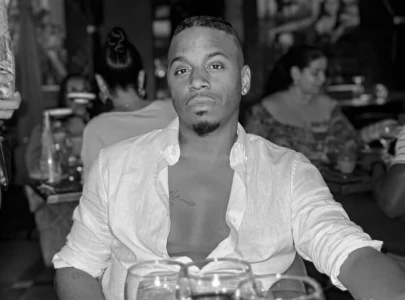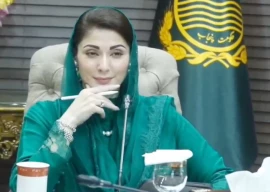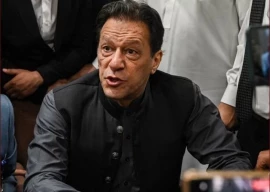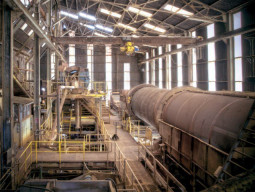
As the security situation in the country worsened, the festival became a shadow of its former glorious self. Crowds shrunk and the events became smaller. Things went further downhill, when the group was accused of embezzling funds allocated to them for a project by the USAID. Most corporate sponsors pulled out their financial support, except the Norwegian government who sent a team to audit the company’s books but did not find anything.
This year, however, the RPTW ventured back into the realm of mega-scale festivals and focused on winning back their audiences from the yesteryears.

Kamaliya from Ukraine Performing at the WPAF 2006 in the open air theatre. PHOTO: RAFI PEER THEATRE WORKSHOP

Theatre performance from Czech Republic at the WPAF 2007. PHOTO: RAFI PEER THEATRE WORKSHOP
“The festivals never stopped,” says Saadaan Peerzada, the chief operating officer at RPTW. “A lot has changed in Pakistan, both politically and culturally, but we have kept ourselves alive through it all.” Alena Peerzada, director programmes and operations at RPTW elaborates that the strong foundation of the company has helped them regain their courage, return to mainstream venues and put on shows the way they used to. However, having helped her family rebuild the company for the past 13 years, Alena is well-aware that putting RPTW back on the cultural map is not merely about putting on a show but also involves coordinating with government agencies and the bureaucratic chain of command.
“It is because of the current army operation that people like us have gotten the opportunities to host the festival as it used to be," she says.
s,” she says. Previously, a No Objection Certificate for an event could be obtained from the Governor House but one has to contact the Chief Minister now to get the same things done. “The point of the matter is that the police are scared of taking action in large crowds these days and we’ve had to overcome all these hurdles,” she says.

Krishan Lal Bheel from Sindh performing outdoors at the WPAF 2007. PHOTO: RAFI PEER THEATRE WORKSHOP
Having operated in a complicated country like Pakistan for over three decades, however, has taught the RPTW a thing or two about survival. As governments changed and the space for art continued to fluctuate, they learnt to navigate the waters accordingly. “Our government never stopped anything nor did they support it,” says Saadan. “They have played a very dormant role but we feel that now is the time they [should] take a more active role. They have the funds but are not willing to spend them on the arts.”

Traditional Giddha Performance from Amritsar at the WPAF 2007, in the open air theatre at Alhamra Cultural Complex Gaddafi Stadium, Lahore. PHOTO: RAFI PEER THEATRE WORKSHOP

Music Night 2006 at the WPAF in the open air theatre, Alhamra Cultural Complex Gaddafi Stadium. PHOTO: RAFI PEER THEATRE WORKSHOP
But until that happens, RPTW has decided to be the master of their own destiny. Last year, they organised a Sufi festival at the Alhamra Arts Council in Lahore to test the waters and gauge if people still had an appetite for what they had to offer. “It was the overwhelming response that allowed us to come out with a bang this year,” says Usman Peerzada, the chief executive officer of the group. Along with overwhelming support from the general public, the artist community also stepped up to support the institution that has kept art afloat in the country for many years. “When people have grand visions there will always be opposition and there will be guns pointed at them,” says veteran dancer Nighat Chaudhry, who credits RPTW for giving dance in Pakistan an international platform says. “But since they have supported the arts and artists all their lives, it’s our turn to support them now.” Choreographer and dancer Wahab Shah, who has been with the group since 2006 feels that the barriers that RPTW has had to face have been part of the deal for everyone who has tried to do things differently in Pakistan and portray a positive image of the country. “But what they don’t realise is that the arts cannot be stopped and it is the same resilience that has made it possible for Rafi Peer to make a comeback this year,” he adds.

Navtej Johar from India performing live at the WPAF 2008. PHOTO: RAFI PEER THEATRE WORKSHOP
Saadan believes that RPTW’s comeback has been timely since the public is bored of dharnas and political strife and needs an outlet. “Hence, this year we have brought back all our festivals at the same time, not only in Pakistan but also in India. We want to show the world that Rafi Peer can withstand all storms and come out stronger,” he says.

Momina Sibtain is a fashion and lifestyle correspondent for The Express Tribune. She tweets @MominaSibtain
Published in The Express Tribune, Sunday Magazine, November 16th, 2014.

1731916090-0/sabrina-(3)1731916090-0-165x106.webp)


1732020599-0/BeFunky-collage-(73)1732020599-0-165x106.webp)



1724319076-0/Untitled-design-(5)1724319076-0-270x192.webp)








COMMENTS
Comments are moderated and generally will be posted if they are on-topic and not abusive.
For more information, please see our Comments FAQ